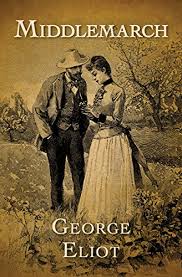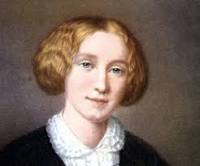Middlemarch Page #2
Middlemarch, A Study of Provincial Life is a novel by the English author George Eliot, appearing in eight instalments in 1871 and 1872. Set in a fictitious Midlands town from 1829 to 1832, it follows distinct, intersecting stories with many characters.
In Mr. Brooke the hereditary strain of Puritan energy was clearly in abeyance; but in his niece Dorothea it glowed alike through faults and virtues, turning sometimes into impatience of her uncle’s talk or his way of “letting things be” on his estate, and making her long all the more for the time when she would be of age and have some command of money for generous schemes. She was regarded as an heiress; for not only had the sisters seven hundred a-year each from their parents, but if Dorothea married and had a son, that son would inherit Mr. Brooke’s estate, presumably worth about three thousand a-year—a rental which seemed wealth to provincial families, still discussing Mr. Peel’s late conduct on the Catholic question, innocent of future gold-fields, and of that gorgeous plutocracy which has so nobly exalted the necessities of genteel life. And how should Dorothea not marry?—a girl so handsome and with such prospects? Nothing could hinder it but her love of extremes, and her insistence on regulating life according to notions which might cause a wary man to hesitate before he made her an offer, or even might lead her at last to refuse all offers. A young lady of some birth and fortune, who knelt suddenly down on a brick floor by the side of a sick laborer and prayed fervidly as if she thought herself living in the time of the Apostles—who had strange whims of fasting like a Papist, and of sitting up at night to read old theological books! Such a wife might awaken you some fine morning with a new scheme for the application of her income which would interfere with political economy and the keeping of saddle-horses: a man would naturally think twice before he risked himself in such fellowship. Women were expected to have weak opinions; but the great safeguard of society and of domestic life was, that opinions were not acted on. Sane people did what their neighbors did, so that if any lunatics were at large, one might know and avoid them. The rural opinion about the new young ladies, even among the cottagers, was generally in favor of Celia, as being so amiable and innocent-looking, while Miss Brooke’s large eyes seemed, like her religion, too unusual and striking. Poor Dorothea! compared with her, the innocent-looking Celia was knowing and worldly-wise; so much subtler is a human mind than the outside tissues which make a sort of blazonry or clock-face for it. Yet those who approached Dorothea, though prejudiced against her by this alarming hearsay, found that she had a charm unaccountably reconcilable with it. Most men thought her bewitching when she was on horseback. She loved the fresh air and the various aspects of the country, and when her eyes and cheeks glowed with mingled pleasure she looked very little like a devotee. Riding was an indulgence which she allowed herself in spite of conscientious qualms; she felt that she enjoyed it in a pagan sensuous way, and always looked forward to renouncing it. She was open, ardent, and not in the least self-admiring; indeed, it was pretty to see how her imagination adorned her sister Celia with attractions altogether superior to her own, and if any gentleman appeared to come to the Grange from some other motive than that of seeing Mr. Brooke, she concluded that he must be in love with Celia: Sir James Chettam, for example, whom she constantly considered from Celia’s point of view, inwardly debating whether it would be good for Celia to accept him. That he should be regarded as a suitor to herself would have seemed to her a ridiculous irrelevance. Dorothea, with all her eagerness to know the truths of life, retained very childlike ideas about marriage. She felt sure that she would have accepted the judicious Hooker, if she had been born in time to save him from that wretched mistake he made in matrimony; or John Milton when his blindness had come on; or any of the other great men whose odd habits it would have been glorious piety to endure; but an amiable handsome baronet, who said “Exactly” to her remarks even when she expressed uncertainty,—how could he affect her as a lover? The really delightful marriage must be that where your husband was a sort of father, and could teach you even Hebrew, if you wished it. These peculiarities of Dorothea’s character caused Mr. Brooke to be all the more blamed in neighboring families for not securing some middle-aged lady as guide and companion to his nieces. But he himself dreaded so much the sort of superior woman likely to be available for such a position, that he allowed himself to be dissuaded by Dorothea’s objections, and was in this case brave enough to defy the world—that is to say, Mrs. Cadwallader the Rector’s wife, and the small group of gentry with whom he visited in the northeast corner of Loamshire. So Miss Brooke presided in her uncle’s household, and did not at all dislike her new authority, with the homage that belonged to it. Sir James Chettam was going to dine at the Grange to-day with another gentleman whom the girls had never seen, and about whom Dorothea felt some venerating expectation. This was the Reverend Edward Casaubon, noted in the county as a man of profound learning, understood for many years to be engaged on a great work concerning religious history; also as a man of wealth enough to give lustre to his piety, and having views of his own which were to be more clearly ascertained on the publication of his book. His very name carried an impressiveness hardly to be measured without a precise chronology of scholarship. Early in the day Dorothea had returned from the infant school which she had set going in the village, and was taking her usual place in the pretty sitting-room which divided the bedrooms of the sisters, bent on finishing a plan for some buildings (a kind of work which she delighted in), when Celia, who had been watching her with a hesitating desire to propose something, said— “Dorothea, dear, if you don’t mind—if you are not very busy—suppose we looked at mamma’s jewels to-day, and divided them? It is exactly six months to-day since uncle gave them to you, and you have not looked at them yet.” Celia’s face had the shadow of a pouting expression in it, the full presence of the pout being kept back by an habitual awe of Dorothea and principle; two associated facts which might show a mysterious electricity if you touched them incautiously. To her relief, Dorothea’s eyes were full of laughter as she looked up. “What a wonderful little almanac you are, Celia! Is it six calendar or six lunar months?”
Translation
Translate and read this book in other languages:
Select another language:
- - Select -
- 简体中文 (Chinese - Simplified)
- 繁體中文 (Chinese - Traditional)
- Español (Spanish)
- Esperanto (Esperanto)
- 日本語 (Japanese)
- Português (Portuguese)
- Deutsch (German)
- العربية (Arabic)
- Français (French)
- Русский (Russian)
- ಕನ್ನಡ (Kannada)
- 한국어 (Korean)
- עברית (Hebrew)
- Gaeilge (Irish)
- Українська (Ukrainian)
- اردو (Urdu)
- Magyar (Hungarian)
- मानक हिन्दी (Hindi)
- Indonesia (Indonesian)
- Italiano (Italian)
- தமிழ் (Tamil)
- Türkçe (Turkish)
- తెలుగు (Telugu)
- ภาษาไทย (Thai)
- Tiếng Việt (Vietnamese)
- Čeština (Czech)
- Polski (Polish)
- Bahasa Indonesia (Indonesian)
- Românește (Romanian)
- Nederlands (Dutch)
- Ελληνικά (Greek)
- Latinum (Latin)
- Svenska (Swedish)
- Dansk (Danish)
- Suomi (Finnish)
- فارسی (Persian)
- ייִדיש (Yiddish)
- հայերեն (Armenian)
- Norsk (Norwegian)
- English (English)
Citation
Use the citation below to add this book to your bibliography:
Style:MLAChicagoAPA
"Middlemarch Books." Literature.com. STANDS4 LLC, 2024. Web. 21 Dec. 2024. <https://www.literature.com/book/middlemarch_242>.




Discuss this Middlemarch book with the community:
Report Comment
We're doing our best to make sure our content is useful, accurate and safe.
If by any chance you spot an inappropriate comment while navigating through our website please use this form to let us know, and we'll take care of it shortly.
Attachment
You need to be logged in to favorite.
Log In